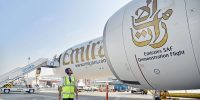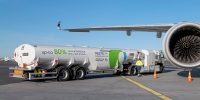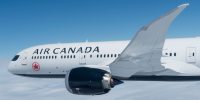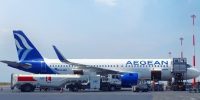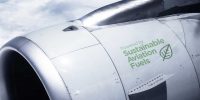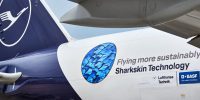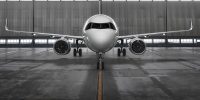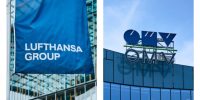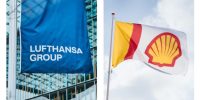Following nature’s example, Lufthansa Technik and BASF have jointly developed the functional surface film AeroSHARK for commercial aircraft. The film is modeled on the microscopic structure of shark skin and is applied to the aircraft’s outer skin. It directly reduces aircraft drag, cuts kerosene consumption and thus CO₂ emissions.
The Lufthansa Group will be the first airline group in the world to equip more than 20 long-haul aircraft in its fleet with aerodynamic sharkskin film. Following extensive testing and a certification process lasting several months, the European Union Aviation Safety Agency (EASA) has now granted Lufthansa Technik a Supplemental Type Certificate (STC) for the series application of this technology on two Boeing 777 models.
In the future, all twelve long-haul B777-300ER aircraft at SWISS will fly with the fuel-saving surface technology. The same applies to Lufthansa Cargo’s current fleet of eleven Boeing 777F freighters. The first SWISS aircraft equipped with AeroSHARK (registration HB-JNH) has already been in scheduled service since October. This aircraft had also completed the flight test program for the certification it has now received. In January 2023, the next Boeing 777 aircraft in Frankfurt and Zurich are scheduled to be modified with the riblet films.
“For a more sustainable future in aviation, we are consistently driving change in our industry. Our ambitious goal: a neutral CO₂ balance by 2050. Already by 2030, we want to halve our net CO₂ emissions compared to 2019. With the broad rollout of the AeroSHARK surface technology developed by Lufthansa Technik together with BASF, we are once again underlining our innovation leadership. We are the first airline group worldwide to use this new technology,” said Christina Foerster, Member of the Lufthansa Group’s Executive Board, responsible for Brand and Sustainability. “By covering more than 20 aircraft with the new sharkskin film, we will reduce the Lufthansa Group’s CO₂ footprint by more than 25,000 tons annually.”
By covering more than 20 aircraft with the new sharkskin film, we will reduce the Lufthansa Group’s CO₂ footprint by more than 25,000 tons annually
Christina Foerster, Lufthansa Group’s Brand and Sustainability.
AeroSHARK consists of millions of ribs around 50 micrometers in size, known as riblets. They imitate the properties of sharkskin and thus optimize aerodynamics at flow-relevant points of the aircraft such as the fuselage or the engine nacelles. As a result, less fuel is required. By covering 950 square meters of a Boeing 777-300ER’s outer skin, for example, annual savings of around 400 tons of kerosene and more than 1,200 tons of CO₂ can be achieved.
The Lufthansa Group assumes responsibility for effective climate protection with a clearly defined path toward CO2 neutrality: By 2030, the company’s own net CO2 emissions are to be halved compared to 2019, and by 2050, the Lufthansa Group wants to achieve a neutral CO2 balance. To this end, the company relies on accelerated fleet modernization, the continuous optimization of flight operations, the use of sustainable aviation fuels and innovative offers for its customers to make a flight CO2-neutral.
The Lufthansa Group is an aviation group with operations worldwide. With 105,290 employees, the Lufthansa Group generated revenue of EUR 16,811m in the financial year 2021. The Lufthansa Group is composed of the segments Network Airlines, Eurowings and Aviation Services. Aviation Services comprises the segments Logistics, MRO, Catering and Additional Businesses and Group Functions. The latter also include Lufthansa AirPlus, Lufthansa Aviation Training and the IT companies. All segments occupy a leading position in their respective markets.
The Lufthansa Group is an aviation company with operations worldwide. It plays a leading role in its European home market. With 105,290 employees, the Lufthansa Group generated revenue of EUR 16,811m in the financial year 2021.
The Lufthansa Group is composed of the segments Network Airlines, Eurowings and the Aviation Services. The Network Airlines segment comprises Lufthansa German Airlines, SWISS, Austrian Airlines and Brussels Airlines. Lufthansa German Airlines also includes regional airlines Lufthansa CityLine and Air Dolomiti as well as Eurowings Discover, the new holiday airline from the Lufthansa Group which started operations in July 2021 and focuses on the touristic segment. Eurowings focuses on short-haul traffic in European point-to-point traffic. Aviation Services particularly includes the Logistics, MRO and Catering segments. The Lufthansa Group also includes the Additional Businesses and Group Functions. This business segment includes in particular Lufthansa AirPlus, Lufthansa Aviation Training and Lufthansa Systems.
The Lufthansa group has committed itself to reduce its carbon footprint to 50% by 2030 and 0% by 2050
About BASF
The information on this page may have been provided by a contributor and no guarantees can be made about the accuracy of any content. Contributors must obtain all necessary licenses and/or ownership rights from the relevant content owner(s) before submitting the same for publication. AirlineSustainabilityScoreCard™ disclaims all liability arising from the publication of content received from contributors. Links to third party sites shall not be considered an endorsement by AirlineSustainabilityScoreCard™. Please refer to our Disclaimer for more details.

Following nature’s example, Lufthansa Technik and BASF have jointly developed the functional surface film AeroSHARK for commercial aircraft. The film is modeled on the microscopic structure of shark skin and is applied to the aircraft’s outer skin. It directly reduces aircraft drag, cuts kerosene consumption and thus CO₂ emissions.
The Lufthansa Group will be the first airline group in the world to equip more than 20 long-haul aircraft in its fleet with aerodynamic sharkskin film. Following extensive testing and a certification process lasting several months, the European Union Aviation Safety Agency (EASA) has now granted Lufthansa Technik a Supplemental Type Certificate (STC) for the series application of this technology on two Boeing 777 models.
In the future, all twelve long-haul B777-300ER aircraft at SWISS will fly with the fuel-saving surface technology. The same applies to Lufthansa Cargo’s current fleet of eleven Boeing 777F freighters. The first SWISS aircraft equipped with AeroSHARK (registration HB-JNH) has already been in scheduled service since October. This aircraft had also completed the flight test program for the certification it has now received. In January 2023, the next Boeing 777 aircraft in Frankfurt and Zurich are scheduled to be modified with the riblet films.
“For a more sustainable future in aviation, we are consistently driving change in our industry. Our ambitious goal: a neutral CO₂ balance by 2050. Already by 2030, we want to halve our net CO₂ emissions compared to 2019. With the broad rollout of the AeroSHARK surface technology developed by Lufthansa Technik together with BASF, we are once again underlining our innovation leadership. We are the first airline group worldwide to use this new technology,” said Christina Foerster, Member of the Lufthansa Group’s Executive Board, responsible for Brand and Sustainability. “By covering more than 20 aircraft with the new sharkskin film, we will reduce the Lufthansa Group’s CO₂ footprint by more than 25,000 tons annually.”
By covering more than 20 aircraft with the new sharkskin film, we will reduce the Lufthansa Group’s CO₂ footprint by more than 25,000 tons annually
Christina Foerster, Lufthansa Group’s Brand and Sustainability.
AeroSHARK consists of millions of ribs around 50 micrometers in size, known as riblets. They imitate the properties of sharkskin and thus optimize aerodynamics at flow-relevant points of the aircraft such as the fuselage or the engine nacelles. As a result, less fuel is required. By covering 950 square meters of a Boeing 777-300ER’s outer skin, for example, annual savings of around 400 tons of kerosene and more than 1,200 tons of CO₂ can be achieved.
The Lufthansa Group assumes responsibility for effective climate protection with a clearly defined path toward CO2 neutrality: By 2030, the company’s own net CO2 emissions are to be halved compared to 2019, and by 2050, the Lufthansa Group wants to achieve a neutral CO2 balance. To this end, the company relies on accelerated fleet modernization, the continuous optimization of flight operations, the use of sustainable aviation fuels and innovative offers for its customers to make a flight CO2-neutral.
The Lufthansa Group is an aviation group with operations worldwide. With 105,290 employees, the Lufthansa Group generated revenue of EUR 16,811m in the financial year 2021. The Lufthansa Group is composed of the segments Network Airlines, Eurowings and Aviation Services. Aviation Services comprises the segments Logistics, MRO, Catering and Additional Businesses and Group Functions. The latter also include Lufthansa AirPlus, Lufthansa Aviation Training and the IT companies. All segments occupy a leading position in their respective markets.
The Lufthansa Group is an aviation company with operations worldwide. It plays a leading role in its European home market. With 105,290 employees, the Lufthansa Group generated revenue of EUR 16,811m in the financial year 2021.
The Lufthansa Group is composed of the segments Network Airlines, Eurowings and the Aviation Services. The Network Airlines segment comprises Lufthansa German Airlines, SWISS, Austrian Airlines and Brussels Airlines. Lufthansa German Airlines also includes regional airlines Lufthansa CityLine and Air Dolomiti as well as Eurowings Discover, the new holiday airline from the Lufthansa Group which started operations in July 2021 and focuses on the touristic segment. Eurowings focuses on short-haul traffic in European point-to-point traffic. Aviation Services particularly includes the Logistics, MRO and Catering segments. The Lufthansa Group also includes the Additional Businesses and Group Functions. This business segment includes in particular Lufthansa AirPlus, Lufthansa Aviation Training and Lufthansa Systems.
The Lufthansa group has committed itself to reduce its carbon footprint to 50% by 2030 and 0% by 2050
About BASF
The information on this page may have been provided by a contributor and no guarantees can be made about the accuracy of any content. Contributors must obtain all necessary licenses and/or ownership rights from the relevant content owner(s) before submitting the same for publication. AirlineSustainabilityScoreCard™ disclaims all liability arising from the publication of content received from contributors. Links to third party sites shall not be considered an endorsement by AirlineSustainabilityScoreCard™. Please refer to our Disclaimer for more details.
Following nature’s example, Lufthansa Technik and BASF have jointly developed the functional surface film AeroSHARK for commercial aircraft. The film is modeled on the microscopic structure of shark skin and is applied to the aircraft’s outer skin. It directly reduces aircraft drag, cuts kerosene consumption and thus CO₂ emissions.
The Lufthansa Group will be the first airline group in the world to equip more than 20 long-haul aircraft in its fleet with aerodynamic sharkskin film. Following extensive testing and a certification process lasting several months, the European Union Aviation Safety Agency (EASA) has now granted Lufthansa Technik a Supplemental Type Certificate (STC) for the series application of this technology on two Boeing 777 models.
In the future, all twelve long-haul B777-300ER aircraft at SWISS will fly with the fuel-saving surface technology. The same applies to Lufthansa Cargo’s current fleet of eleven Boeing 777F freighters. The first SWISS aircraft equipped with AeroSHARK (registration HB-JNH) has already been in scheduled service since October. This aircraft had also completed the flight test program for the certification it has now received. In January 2023, the next Boeing 777 aircraft in Frankfurt and Zurich are scheduled to be modified with the riblet films.
“For a more sustainable future in aviation, we are consistently driving change in our industry. Our ambitious goal: a neutral CO₂ balance by 2050. Already by 2030, we want to halve our net CO₂ emissions compared to 2019. With the broad rollout of the AeroSHARK surface technology developed by Lufthansa Technik together with BASF, we are once again underlining our innovation leadership. We are the first airline group worldwide to use this new technology,” said Christina Foerster, Member of the Lufthansa Group’s Executive Board, responsible for Brand and Sustainability. “By covering more than 20 aircraft with the new sharkskin film, we will reduce the Lufthansa Group’s CO₂ footprint by more than 25,000 tons annually.”
By covering more than 20 aircraft with the new sharkskin film, we will reduce the Lufthansa Group’s CO₂ footprint by more than 25,000 tons annually
Christina Foerster, Lufthansa Group’s Brand and Sustainability.
AeroSHARK consists of millions of ribs around 50 micrometers in size, known as riblets. They imitate the properties of sharkskin and thus optimize aerodynamics at flow-relevant points of the aircraft such as the fuselage or the engine nacelles. As a result, less fuel is required. By covering 950 square meters of a Boeing 777-300ER’s outer skin, for example, annual savings of around 400 tons of kerosene and more than 1,200 tons of CO₂ can be achieved.
The Lufthansa Group assumes responsibility for effective climate protection with a clearly defined path toward CO2 neutrality: By 2030, the company’s own net CO2 emissions are to be halved compared to 2019, and by 2050, the Lufthansa Group wants to achieve a neutral CO2 balance. To this end, the company relies on accelerated fleet modernization, the continuous optimization of flight operations, the use of sustainable aviation fuels and innovative offers for its customers to make a flight CO2-neutral.
The Lufthansa Group is an aviation group with operations worldwide. With 105,290 employees, the Lufthansa Group generated revenue of EUR 16,811m in the financial year 2021. The Lufthansa Group is composed of the segments Network Airlines, Eurowings and Aviation Services. Aviation Services comprises the segments Logistics, MRO, Catering and Additional Businesses and Group Functions. The latter also include Lufthansa AirPlus, Lufthansa Aviation Training and the IT companies. All segments occupy a leading position in their respective markets.
The Lufthansa Group is an aviation company with operations worldwide. It plays a leading role in its European home market. With 105,290 employees, the Lufthansa Group generated revenue of EUR 16,811m in the financial year 2021.
The Lufthansa Group is composed of the segments Network Airlines, Eurowings and the Aviation Services. The Network Airlines segment comprises Lufthansa German Airlines, SWISS, Austrian Airlines and Brussels Airlines. Lufthansa German Airlines also includes regional airlines Lufthansa CityLine and Air Dolomiti as well as Eurowings Discover, the new holiday airline from the Lufthansa Group which started operations in July 2021 and focuses on the touristic segment. Eurowings focuses on short-haul traffic in European point-to-point traffic. Aviation Services particularly includes the Logistics, MRO and Catering segments. The Lufthansa Group also includes the Additional Businesses and Group Functions. This business segment includes in particular Lufthansa AirPlus, Lufthansa Aviation Training and Lufthansa Systems.
The Lufthansa group has committed itself to reduce its carbon footprint to 50% by 2030 and 0% by 2050
About BASF
The information on this page may have been provided by a contributor and no guarantees can be made about the accuracy of any content. Contributors must obtain all necessary licenses and/or ownership rights from the relevant content owner(s) before submitting the same for publication. AirlineSustainabilityScoreCard™ disclaims all liability arising from the publication of content received from contributors. Links to third party sites shall not be considered an endorsement by AirlineSustainabilityScoreCard™. Please refer to our Disclaimer for more details.
Following nature’s example, Lufthansa Technik and BASF have jointly developed the functional surface film AeroSHARK for commercial aircraft. The film is modeled on the microscopic structure of shark skin and is applied to the aircraft’s outer skin. It directly reduces aircraft drag, cuts kerosene consumption and thus CO₂ emissions.
The Lufthansa Group will be the first airline group in the world to equip more than 20 long-haul aircraft in its fleet with aerodynamic sharkskin film. Following extensive testing and a certification process lasting several months, the European Union Aviation Safety Agency (EASA) has now granted Lufthansa Technik a Supplemental Type Certificate (STC) for the series application of this technology on two Boeing 777 models.
In the future, all twelve long-haul B777-300ER aircraft at SWISS will fly with the fuel-saving surface technology. The same applies to Lufthansa Cargo’s current fleet of eleven Boeing 777F freighters. The first SWISS aircraft equipped with AeroSHARK (registration HB-JNH) has already been in scheduled service since October. This aircraft had also completed the flight test program for the certification it has now received. In January 2023, the next Boeing 777 aircraft in Frankfurt and Zurich are scheduled to be modified with the riblet films.
“For a more sustainable future in aviation, we are consistently driving change in our industry. Our ambitious goal: a neutral CO₂ balance by 2050. Already by 2030, we want to halve our net CO₂ emissions compared to 2019. With the broad rollout of the AeroSHARK surface technology developed by Lufthansa Technik together with BASF, we are once again underlining our innovation leadership. We are the first airline group worldwide to use this new technology,” said Christina Foerster, Member of the Lufthansa Group’s Executive Board, responsible for Brand and Sustainability. “By covering more than 20 aircraft with the new sharkskin film, we will reduce the Lufthansa Group’s CO₂ footprint by more than 25,000 tons annually.”
By covering more than 20 aircraft with the new sharkskin film, we will reduce the Lufthansa Group’s CO₂ footprint by more than 25,000 tons annually
Christina Foerster, Lufthansa Group’s Brand and Sustainability.
AeroSHARK consists of millions of ribs around 50 micrometers in size, known as riblets. They imitate the properties of sharkskin and thus optimize aerodynamics at flow-relevant points of the aircraft such as the fuselage or the engine nacelles. As a result, less fuel is required. By covering 950 square meters of a Boeing 777-300ER’s outer skin, for example, annual savings of around 400 tons of kerosene and more than 1,200 tons of CO₂ can be achieved.
The Lufthansa Group assumes responsibility for effective climate protection with a clearly defined path toward CO2 neutrality: By 2030, the company’s own net CO2 emissions are to be halved compared to 2019, and by 2050, the Lufthansa Group wants to achieve a neutral CO2 balance. To this end, the company relies on accelerated fleet modernization, the continuous optimization of flight operations, the use of sustainable aviation fuels and innovative offers for its customers to make a flight CO2-neutral.
The Lufthansa Group is an aviation group with operations worldwide. With 105,290 employees, the Lufthansa Group generated revenue of EUR 16,811m in the financial year 2021. The Lufthansa Group is composed of the segments Network Airlines, Eurowings and Aviation Services. Aviation Services comprises the segments Logistics, MRO, Catering and Additional Businesses and Group Functions. The latter also include Lufthansa AirPlus, Lufthansa Aviation Training and the IT companies. All segments occupy a leading position in their respective markets.
The Lufthansa Group is an aviation company with operations worldwide. It plays a leading role in its European home market. With 105,290 employees, the Lufthansa Group generated revenue of EUR 16,811m in the financial year 2021.
The Lufthansa Group is composed of the segments Network Airlines, Eurowings and the Aviation Services. The Network Airlines segment comprises Lufthansa German Airlines, SWISS, Austrian Airlines and Brussels Airlines. Lufthansa German Airlines also includes regional airlines Lufthansa CityLine and Air Dolomiti as well as Eurowings Discover, the new holiday airline from the Lufthansa Group which started operations in July 2021 and focuses on the touristic segment. Eurowings focuses on short-haul traffic in European point-to-point traffic. Aviation Services particularly includes the Logistics, MRO and Catering segments. The Lufthansa Group also includes the Additional Businesses and Group Functions. This business segment includes in particular Lufthansa AirPlus, Lufthansa Aviation Training and Lufthansa Systems.
The Lufthansa group has committed itself to reduce its carbon footprint to 50% by 2030 and 0% by 2050
About BASF
The information on this page may have been provided by a contributor and no guarantees can be made about the accuracy of any content. Contributors must obtain all necessary licenses and/or ownership rights from the relevant content owner(s) before submitting the same for publication. AirlineSustainabilityScoreCard™ disclaims all liability arising from the publication of content received from contributors. Links to third party sites shall not be considered an endorsement by AirlineSustainabilityScoreCard™. Please refer to our Disclaimer for more details.

Following nature’s example, Lufthansa Technik and BASF have jointly developed the functional surface film AeroSHARK for commercial aircraft. The film is modeled on the microscopic structure of shark skin and is applied to the aircraft’s outer skin. It directly reduces aircraft drag, cuts kerosene consumption and thus CO₂ emissions.
The Lufthansa Group will be the first airline group in the world to equip more than 20 long-haul aircraft in its fleet with aerodynamic sharkskin film. Following extensive testing and a certification process lasting several months, the European Union Aviation Safety Agency (EASA) has now granted Lufthansa Technik a Supplemental Type Certificate (STC) for the series application of this technology on two Boeing 777 models.
In the future, all twelve long-haul B777-300ER aircraft at SWISS will fly with the fuel-saving surface technology. The same applies to Lufthansa Cargo’s current fleet of eleven Boeing 777F freighters. The first SWISS aircraft equipped with AeroSHARK (registration HB-JNH) has already been in scheduled service since October. This aircraft had also completed the flight test program for the certification it has now received. In January 2023, the next Boeing 777 aircraft in Frankfurt and Zurich are scheduled to be modified with the riblet films.
“For a more sustainable future in aviation, we are consistently driving change in our industry. Our ambitious goal: a neutral CO₂ balance by 2050. Already by 2030, we want to halve our net CO₂ emissions compared to 2019. With the broad rollout of the AeroSHARK surface technology developed by Lufthansa Technik together with BASF, we are once again underlining our innovation leadership. We are the first airline group worldwide to use this new technology,” said Christina Foerster, Member of the Lufthansa Group’s Executive Board, responsible for Brand and Sustainability. “By covering more than 20 aircraft with the new sharkskin film, we will reduce the Lufthansa Group’s CO₂ footprint by more than 25,000 tons annually.”
By covering more than 20 aircraft with the new sharkskin film, we will reduce the Lufthansa Group’s CO₂ footprint by more than 25,000 tons annually
Christina Foerster, Lufthansa Group’s Brand and Sustainability.
AeroSHARK consists of millions of ribs around 50 micrometers in size, known as riblets. They imitate the properties of sharkskin and thus optimize aerodynamics at flow-relevant points of the aircraft such as the fuselage or the engine nacelles. As a result, less fuel is required. By covering 950 square meters of a Boeing 777-300ER’s outer skin, for example, annual savings of around 400 tons of kerosene and more than 1,200 tons of CO₂ can be achieved.
The Lufthansa Group assumes responsibility for effective climate protection with a clearly defined path toward CO2 neutrality: By 2030, the company’s own net CO2 emissions are to be halved compared to 2019, and by 2050, the Lufthansa Group wants to achieve a neutral CO2 balance. To this end, the company relies on accelerated fleet modernization, the continuous optimization of flight operations, the use of sustainable aviation fuels and innovative offers for its customers to make a flight CO2-neutral.
The Lufthansa Group is an aviation group with operations worldwide. With 105,290 employees, the Lufthansa Group generated revenue of EUR 16,811m in the financial year 2021. The Lufthansa Group is composed of the segments Network Airlines, Eurowings and Aviation Services. Aviation Services comprises the segments Logistics, MRO, Catering and Additional Businesses and Group Functions. The latter also include Lufthansa AirPlus, Lufthansa Aviation Training and the IT companies. All segments occupy a leading position in their respective markets.
The Lufthansa Group is an aviation company with operations worldwide. It plays a leading role in its European home market. With 105,290 employees, the Lufthansa Group generated revenue of EUR 16,811m in the financial year 2021.
The Lufthansa Group is composed of the segments Network Airlines, Eurowings and the Aviation Services. The Network Airlines segment comprises Lufthansa German Airlines, SWISS, Austrian Airlines and Brussels Airlines. Lufthansa German Airlines also includes regional airlines Lufthansa CityLine and Air Dolomiti as well as Eurowings Discover, the new holiday airline from the Lufthansa Group which started operations in July 2021 and focuses on the touristic segment. Eurowings focuses on short-haul traffic in European point-to-point traffic. Aviation Services particularly includes the Logistics, MRO and Catering segments. The Lufthansa Group also includes the Additional Businesses and Group Functions. This business segment includes in particular Lufthansa AirPlus, Lufthansa Aviation Training and Lufthansa Systems.
The Lufthansa group has committed itself to reduce its carbon footprint to 50% by 2030 and 0% by 2050
About BASF
The information on this page may have been provided by a contributor and no guarantees can be made about the accuracy of any content. Contributors must obtain all necessary licenses and/or ownership rights from the relevant content owner(s) before submitting the same for publication. AirlineSustainabilityScoreCard™ disclaims all liability arising from the publication of content received from contributors. Links to third party sites shall not be considered an endorsement by AirlineSustainabilityScoreCard™. Please refer to our Disclaimer for more details.
Following nature’s example, Lufthansa Technik and BASF have jointly developed the functional surface film AeroSHARK for commercial aircraft. The film is modeled on the microscopic structure of shark skin and is applied to the aircraft’s outer skin. It directly reduces aircraft drag, cuts kerosene consumption and thus CO₂ emissions.
The Lufthansa Group will be the first airline group in the world to equip more than 20 long-haul aircraft in its fleet with aerodynamic sharkskin film. Following extensive testing and a certification process lasting several months, the European Union Aviation Safety Agency (EASA) has now granted Lufthansa Technik a Supplemental Type Certificate (STC) for the series application of this technology on two Boeing 777 models.
In the future, all twelve long-haul B777-300ER aircraft at SWISS will fly with the fuel-saving surface technology. The same applies to Lufthansa Cargo’s current fleet of eleven Boeing 777F freighters. The first SWISS aircraft equipped with AeroSHARK (registration HB-JNH) has already been in scheduled service since October. This aircraft had also completed the flight test program for the certification it has now received. In January 2023, the next Boeing 777 aircraft in Frankfurt and Zurich are scheduled to be modified with the riblet films.
“For a more sustainable future in aviation, we are consistently driving change in our industry. Our ambitious goal: a neutral CO₂ balance by 2050. Already by 2030, we want to halve our net CO₂ emissions compared to 2019. With the broad rollout of the AeroSHARK surface technology developed by Lufthansa Technik together with BASF, we are once again underlining our innovation leadership. We are the first airline group worldwide to use this new technology,” said Christina Foerster, Member of the Lufthansa Group’s Executive Board, responsible for Brand and Sustainability. “By covering more than 20 aircraft with the new sharkskin film, we will reduce the Lufthansa Group’s CO₂ footprint by more than 25,000 tons annually.”
By covering more than 20 aircraft with the new sharkskin film, we will reduce the Lufthansa Group’s CO₂ footprint by more than 25,000 tons annually
Christina Foerster, Lufthansa Group’s Brand and Sustainability.
AeroSHARK consists of millions of ribs around 50 micrometers in size, known as riblets. They imitate the properties of sharkskin and thus optimize aerodynamics at flow-relevant points of the aircraft such as the fuselage or the engine nacelles. As a result, less fuel is required. By covering 950 square meters of a Boeing 777-300ER’s outer skin, for example, annual savings of around 400 tons of kerosene and more than 1,200 tons of CO₂ can be achieved.
The Lufthansa Group assumes responsibility for effective climate protection with a clearly defined path toward CO2 neutrality: By 2030, the company’s own net CO2 emissions are to be halved compared to 2019, and by 2050, the Lufthansa Group wants to achieve a neutral CO2 balance. To this end, the company relies on accelerated fleet modernization, the continuous optimization of flight operations, the use of sustainable aviation fuels and innovative offers for its customers to make a flight CO2-neutral.
The Lufthansa Group is an aviation group with operations worldwide. With 105,290 employees, the Lufthansa Group generated revenue of EUR 16,811m in the financial year 2021. The Lufthansa Group is composed of the segments Network Airlines, Eurowings and Aviation Services. Aviation Services comprises the segments Logistics, MRO, Catering and Additional Businesses and Group Functions. The latter also include Lufthansa AirPlus, Lufthansa Aviation Training and the IT companies. All segments occupy a leading position in their respective markets.
The Lufthansa Group is an aviation company with operations worldwide. It plays a leading role in its European home market. With 105,290 employees, the Lufthansa Group generated revenue of EUR 16,811m in the financial year 2021.
The Lufthansa Group is composed of the segments Network Airlines, Eurowings and the Aviation Services. The Network Airlines segment comprises Lufthansa German Airlines, SWISS, Austrian Airlines and Brussels Airlines. Lufthansa German Airlines also includes regional airlines Lufthansa CityLine and Air Dolomiti as well as Eurowings Discover, the new holiday airline from the Lufthansa Group which started operations in July 2021 and focuses on the touristic segment. Eurowings focuses on short-haul traffic in European point-to-point traffic. Aviation Services particularly includes the Logistics, MRO and Catering segments. The Lufthansa Group also includes the Additional Businesses and Group Functions. This business segment includes in particular Lufthansa AirPlus, Lufthansa Aviation Training and Lufthansa Systems.
The Lufthansa group has committed itself to reduce its carbon footprint to 50% by 2030 and 0% by 2050
About BASF
The information on this page may have been provided by a contributor and no guarantees can be made about the accuracy of any content. Contributors must obtain all necessary licenses and/or ownership rights from the relevant content owner(s) before submitting the same for publication. AirlineSustainabilityScoreCard™ disclaims all liability arising from the publication of content received from contributors. Links to third party sites shall not be considered an endorsement by AirlineSustainabilityScoreCard™. Please refer to our Disclaimer for more details.


